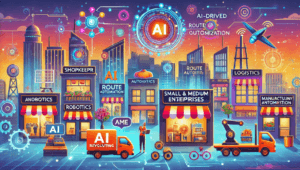AI Revolutionizing Indian SMEs: Faster Growth, Smarter Solutions
AI is transforming small and medium enterprises (SMEs) in India by improving efficiency and enabling faster growth. Experts at Nasscom Global Confluence 2025 emphasized AI’s role in helping SMEs scale without large teams. Jagdish Mitra highlighted AI and cloud-based models as game-changers for rapid expansion. They stressed the need for AI models trained on local data to ensure relevance.
Collaboration between government and private sectors is essential for AI research and innovation. Anurag Sahay pointed out that data, like oil, is renewable but requires extensive preparation. Mitra introduced “Service as Software,” where AI automates traditional services into scalable solutions. Experts urged updating education to align with AI industry needs. Critical thinking and problem-solving skills must be prioritized in curricula. AI is redefining business strategies and accelerating SME success. The event called for swift AI adoption to unlock new opportunities.

AI Revolutionizing Indian SMEs: Faster Growth, Smarter Solutions
Artificial Intelligence (AI) is transforming the way small and medium-sized enterprises (SMEs) operate in India, enabling them to work more efficiently, reduce costs, and scale rapidly. This was the central theme at the Nasscom Global Confluence 2025, a major tech conference held in New Delhi, where industry leaders gathered to discuss how Indian companies can leverage AI to compete globally.
Experts highlighted that AI tools, particularly advanced systems like Agentic AI, are empowering small businesses to innovate and grow without requiring large teams or hefty budgets. Jagdish Mitra, CEO of Humanize Tech, described this shift as a “game-changer” for SMEs. He explained that cloud-based AI solutions enable businesses to automate tasks, analyze data, and make informed decisions quickly—capabilities that previously demanded significant manpower or financial investment. “With AI, even a small team can achieve what once required an army of employees,” Mitra said.
Local Data for Local Solutions
A key challenge discussed at the event was the reliance of many AI models on Western data, which often fails to align with India’s unique cultural, economic, and social landscape. For example, an AI tool trained to predict consumer behavior in the U.S. may not account for India’s diverse languages, regional preferences, or informal retail networks. To address this, experts emphasized the need to develop AI systems using locally sourced data. “AI needs to speak the language of Indian businesses, both literally and figuratively,” one speaker noted. By training models on homegrown datasets, SMEs can create tailored solutions for inventory management, customer service, and marketing that better suit their needs.
Collaboration is Key
The conference also stressed the importance of stronger partnerships between the government and private sector to improve data accessibility for AI development. While India generates vast amounts of data daily—from digital payments to social media interactions—much of it remains fragmented or underutilized. Anurag Sahay, Managing Director of AI and Data Science at Nagarro, likened data to “renewable energy” rather than finite oil reserves. “Data isn’t just something we extract; we can generate and refine it endlessly,” he said. However, he acknowledged that collecting and structuring this data into usable formats remains a challenge. Experts urged policymakers to establish frameworks that promote data sharing while safeguarding privacy, allowing startups and SMEs to innovate responsibly.
From Services to Software
Another groundbreaking concept introduced at the event was “Service as Software”—an approach where AI converts traditional services into scalable digital products. For example, a small accounting firm could use AI to automate tax filing, transforming its expertise into a software tool that serves thousands of clients nationwide. Similarly, a local logistics company might develop an AI-powered platform to optimize delivery routes for businesses across India. Mitra explained, “This approach allows SMEs to transition from offering one-on-one services to creating products with limitless reach, all without massive upfront costs.”
Preparing for an AI-Driven Future
As AI reshapes industries, experts cautioned that India’s education system must evolve to keep pace. Current curricula often emphasize theoretical knowledge over practical skills such as problem-solving and critical thinking—capabilities essential for working with AI. Panelists urged colleges and training institutes to collaborate with tech companies to design courses that bridge this gap. “We need graduates who are not only tech-savvy but also adaptable, creative, and ready to work with AI tools,” said one educator. Upskilling the existing workforce is equally crucial, as industries like manufacturing, retail, and healthcare increasingly require AI literacy.
The Road Ahead
The conference concluded on an optimistic note, with participants agreeing that AI offers SMEs an unprecedented opportunity to compete with larger corporations. By automating routine tasks, predicting market trends, and enhancing customer experiences, small businesses can shift their focus toward innovation and growth. However, success will depend on addressing challenges such as data accessibility, digital infrastructure gaps, and skill development.
For India, where SMEs contribute nearly 30% of GDP and employ over 110 million people, the AI revolution is not just about technology—it’s about unlocking the potential of millions of entrepreneurs. As Mitra summarized, “AI isn’t replacing humans; it’s amplifying their capabilities. The future belongs to businesses that embrace this partnership.”
In short, the message from the event was clear: AI is no longer a luxury reserved for large corporations. With the right tools, training, and policies, India’s small businesses can harness its power to thrive in an increasingly competitive world.
You must be logged in to post a comment.